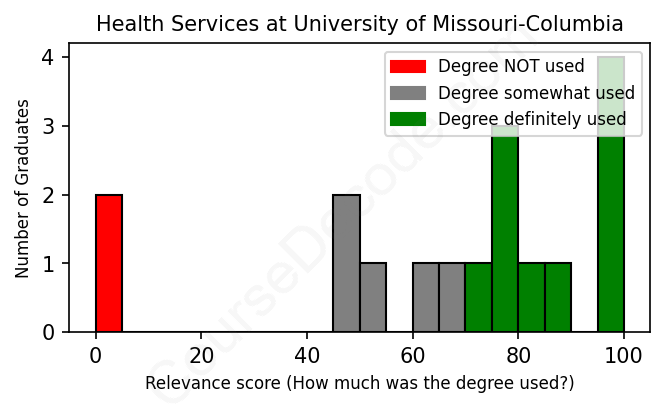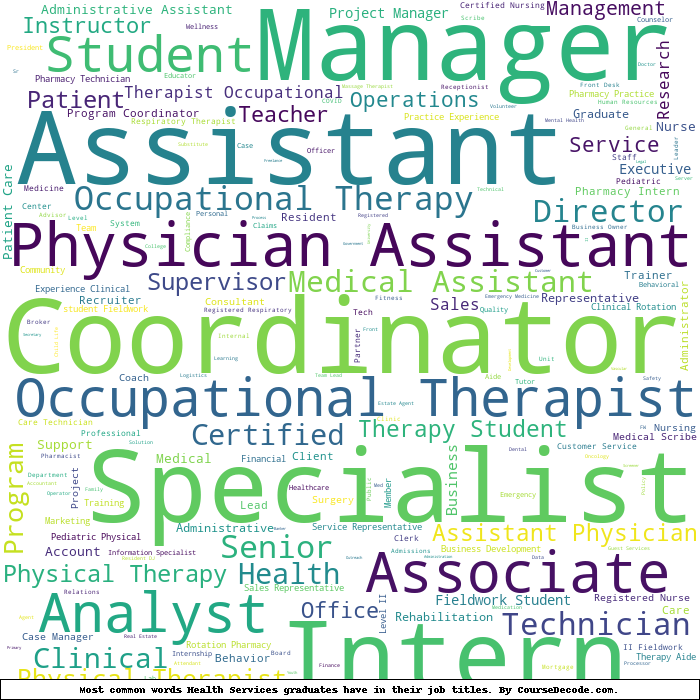
First, some facts. Of the Health Services graduates from University of Missouri-Columbia we've analyzed , here's how many have used (or NOT used) their degree in their career:

These are estimates based on AI analysis of 17 LinkedIn profiles (see below).
The verdict? Slightly below average. Overall, with an average relevance score of 66%, Health Services graduates from University of Missouri-Columbia have a slightly lower likelihood (-1%) of finding work in this field compared to the average graduate across all fields:
And for comparison, here's the chart for all profiles we've looked at across all degrees.
Also, after graduating, 52% of these graduates have pursued further education other than another Bachelor's degree (such as a Masters degree or other), compared to the average across all profiles of 35%. This suggests you may need more than just a Bachelors degree to be competitive as a Health Services graduate.
See the details:
|
Relevance score: 51% We think this person has gone into a career only somewhat relevant to their degree. We think this person has gone into a career only somewhat relevant to their degree.
DEGREE INFOGraduated in 2017 from University of Missouri-Columbia with a Bachelor's degree in Health Services. Also pursued further education since (see below). JOB HISTORY SINCE GRADUATIONCommunity Support Specialist Burrell Behavioral Health May 2017 - Jul 2018 Community Support Specialist  Swope Health Services Jul 2018 - Mar 2020 Community Resource Management Professional  CenterWell Senior Primary Care Sep 2021 - Dec 2023 Referral Coordinator  Humana Mar 2020 - Dec 2023 Creative Development Specialist  Humana Aug 2021 - May 2024 Market Development Specialist  Humana Aug 2022 - May 2024 Senior Process Improvement Professional  Humana May 2024 - Present FURTHER DEGREES DONE SINCE GRADUATINGMaster's degreeBenedictine University School of Graduate, Adult and Professional Education 2017 - 2020 ABOUTIn my role as a market developer I create digital analysis strategies for Humanas newly acquired 7 medicaid states. I develop digital dashboards to track over 300 web pages across 7 states as well as over 135 email and text campaigns to identify key performance indicators. My dashboards promote transparency, accessibility, and efficiency to data insights. To add, I regularly present my findings to market leadership chief operating officers in order to identify opportunities and successes. In addition, develop a Competitive Web Analysis to identify the strengths, weaknesses, and opportunities of our top competitors. Not only do I track our web and campaign efforts, I also engage in creative writing with business owners to develop content that is presented on Humana webpages. Throughout my projects I have excelled at collaborating with internal and external partners to create synergy in market development with new workflows, learning and teaching new technologies such as adobe analytics/google analytics, and developing partnerships. |
The top 10 most common jobs done by the graduates we've analyzed (ranked most common to least) are:
When looking at the types of jobs people with a degree in Health Services from the University of Missouri-Columbia tend to land, there's quite a mix. It seems that many graduates have taken paths in healthcare roles like registered nurses, mental health technicians, and patient care technicians. These positions are directly relevant to the health services field as they require not only the foundational knowledge gained during their studies but also the application of skills in real-world healthcare settings. For instance, registered nurses and mental health techs are hands-on jobs where graduates can actually make a difference in patient care. Roles like the Program Manager at Advocates for Better Health also showcase how some graduates have moved into leadership positions that still utilize their health services background.
On the flip side, there are quite a few graduates who’ve drifted into roles that seem more detached from direct health services applications. Jobs in sales, administration, or marketing often don’t require the specific health knowledge gained in their degree. For example, a Business Development Manager or a Software Administrator may need a basic understanding of healthcare systems, but their core responsibilities focus more on business operations. This trend indicates that while some graduates are utilizing their degree effectively within healthcare, many are veering off into fields that don’t fully take advantage of their specialized training in health services. Overall, it’s a mixed bag—some are rocking it in healthcare, while others are finding their way in other industries that may not fully align with their education.
Here is a visual representation of the most common words in job titles for Health Services graduates (this is across all Health Services graduates we've analyzed, not just those who went to University of Missouri-Columbia):

Looking at the career trajectories of graduates from the Health Services program at the University of Missouri-Columbia, it's clear that many have carved out successful paths in the healthcare field. Right after graduation, most tend to jump into roles that are closely aligned with health services, like medical assistants, nurses, and patient care technicians. For instance, the students graduating in 2018 and 2023 immediately took on positions in medical facilities, showcasing a direct entry into the healthcare workforce. This trend reflects a solid foundation provided by their degree and the workforce needs in health services, which favor these roles for recent grads.
As we look further down the line—five to ten years post-graduation—the picture seems to brighten even more. Many graduates transition into higher-level positions like program managers, nurses in specialized areas, or administrative roles within healthcare organizations. For example, a graduate from 2013 started as a patient concierge and has now moved up to a senior program manager role, while a 2015 graduate climbed the ranks to become a nurse coordinator. Others have found success in business development within the healthcare sector, showing that the versatility of their degree allows for varied career paths. Overall, it seems that graduates are not just filling jobs but are progressing into meaningful and influential roles in the health services field, which is great news if you're considering this program! They generally appear to be leveraging their education effectively and making a positive impact in healthcare settings.
Honestly, the Bachelor degree in Health Services at University of Missouri-Columbia is about average in terms of difficulty, similar to many other programs out there. You'll have your share of coursework that involves healthcare policy, ethics, and the basics of public health, which can get pretty dense at times, but it’s not overly grueling compared to, say, a science-heavy major like nursing or pre-med. If you stay on top of your readings and assignments, and you engage with your professors and classmates, it should be manageable. Overall, it’s a good mix of challenging and rewarding—definitely doable if you’re interested in the subject!
Most commonly, in the LinkedIn profiles we've looked at, it takes people 4 years to finish a Bachelor degree in Health Services.
Looking at the career paths of these Health Services grads from the University of Missouri-Columbia, it seems like most of them have landed decent jobs, especially considering the healthcare industry's growth. The ones working as nurses, like the oncology nurses, and those in managerial roles, such as the business development managers and program managers, are likely making solid salaries, especially with experience. Even the new grads are starting off in positions that usually pay above minimum wage—like patient care technicians—and have a good chance to move up quickly. While some might not be raking in the big bucks just yet, they’re definitely on a path that can lead to decent earnings down the line!
Here is a visual representation of the most common words seen in the "about" section of LinkedIn profiles who have a Bachelor degree in Health Services (this is across all Health Services graduates we've analyzed, not just those who went to University of Missouri-Columbia). This may or may not be useful:

Here are all colleges offering a Bachelor degree in Health Services (ordered by the average relevance score of their Health Services graduates, best to worst) where we have analyzed at least 10 of their graduates:
| College | Score | Count |
|---|---|---|
 The Ohio State University The Ohio State University
|
88 | 14 |
 Quinnipiac University Quinnipiac University
|
88 | 10 |
 Grand Valley State University Grand Valley State University
|
87 | 16 |
 University of Tampa University of Tampa
|
87 | 10 |
 Stony Brook University Stony Brook University
|
80 | 15 |
 Boston University Boston University
|
79 | 12 |
 University of Connecticut University of Connecticut
|
78 | 26 |
 Florida Agricultural and Mechanical University Florida Agricultural and Mechanical University
|
76 | 12 |
 Texas A&M University Texas A&M University
|
72 | 16 |
 University of South Florida University of South Florida
|
72 | 26 |
 Boise State University Boise State University
|
71 | 11 |
 University of Central Florida University of Central Florida
|
68 | 47 |
 Florida Gulf Coast University Florida Gulf Coast University
|
68 | 10 |
 James Madison University James Madison University
|
66 | 26 |
 University of Missouri-Columbia University of Missouri-Columbia
|
66 | 17 |
 California State University, Fullerton California State University, Fullerton
|
66 | 13 |
 California State University - East Bay California State University - East Bay
|
66 | 10 |
 Arizona State University Arizona State University
|
62 | 10 |
 Cleveland State University Cleveland State University
|
60 | 10 |
 Stockton University Stockton University
|
58 | 12 |